This week provided me with an overwhelming range of blog topics. Smoky Seattle skies, even as we’re nearing November. Our company’s upcoming launch of a reimagined website. A return to training in-person clients. And discovering that dropping our daughter off at college the fourth time hurt more than the first. Wanting to keep a positive vibe in my blog, I decided to share a fun discovery from a recent hike to Melakwa Lake: the power of asking good questions.
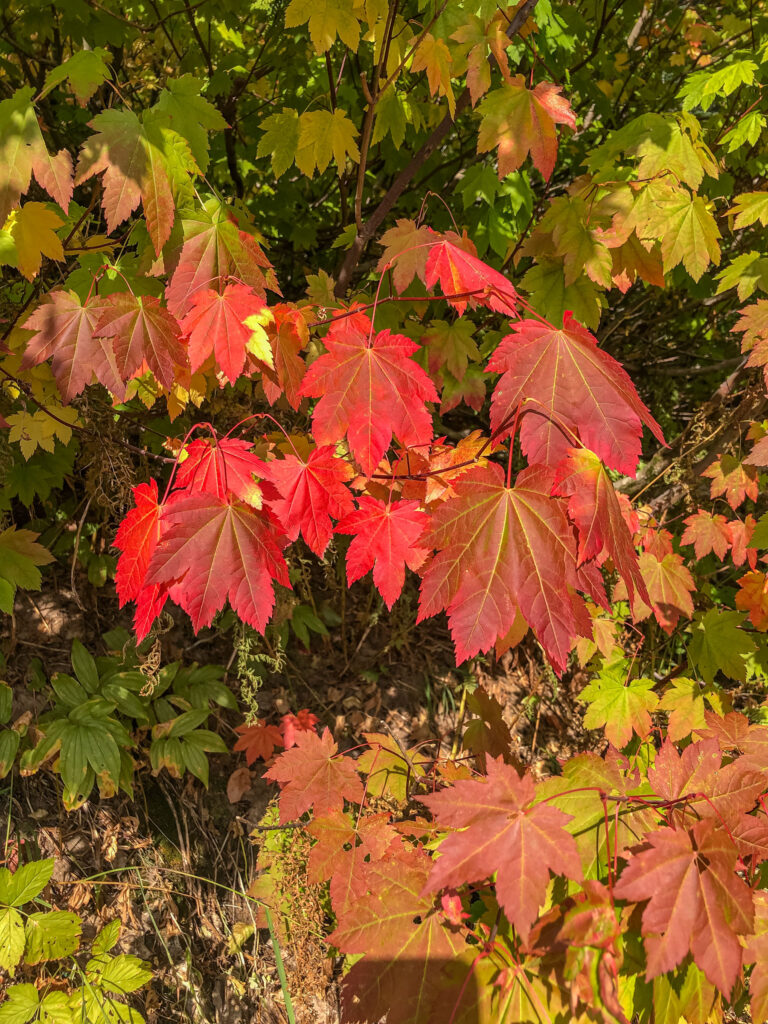
Where Is the Clean Air?
If you have been following my blog, you may recall questions I asked myself on a recent autumn hike to Granite Mountain. This time, one of my most important questions came to me the night before: where can I find clean air? It was hard to do this month, as the Pacific Northwest has been hit hard by some of the worst smoke yet, thanks to wildfires in the mountains and zero rain. I’d perused the AirNow.gov website for possible shifts in the winds, and we decided to go east of Snoqualmie.
As I approached milepost 35 on I-90, I could hardly make out the mountain ridge above. No way can we hike in this! However, once we pulled into the Denny Creek campground twelve miles beyond, my mood improved. Blue skies. No haze. No smoky stench. Mission accomplished. My soul sang. We’d finally get to hike again!

What Makes for Good Questions?
As Ajax, my buddy, and I started up the trail, I eagerly anticipated the deep philosophical exchange that usually develops from our conversations. Later, in my never-ending quest to improve my communication skills, I tried to figure out what helps us have such great discussions. We have a knack for picking up right where we left off. In this case, our last hike together was four months ago. We also care deeply about each other. But perhaps it boils down to asking thought-provoking questions.
What are some of the qualities of good questions? Not only are they short, concise, and descriptive — and asked one at a time — but they also advance a conversation. They help you:
- Avoid confusion
- Provide additional information and clarification
- Get the conversation flowing
- Allow you to express your curiosity
- Explore new directions
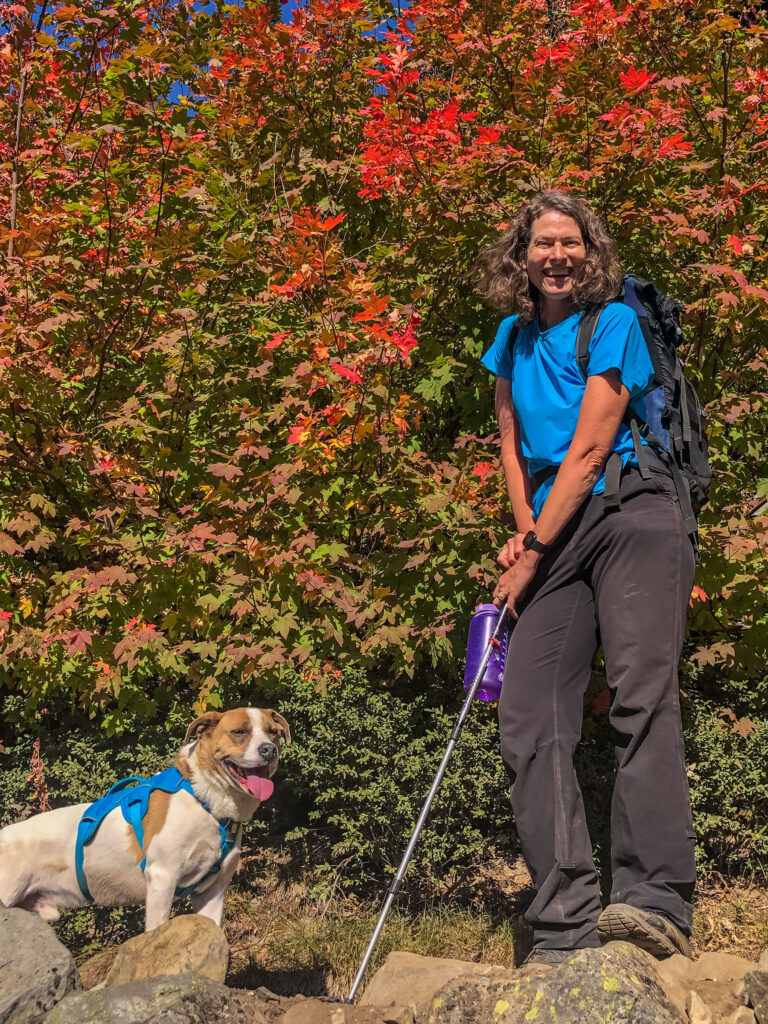
Tips for Asking Good Questions
Bobby Powers provides tips about how to phrase a question on Medium.com. My favorites are:
Ask What and How, not Why
“Why” questions tend to put people on the defensive and make them feel like they’re being grilled. “What” and “how” are more objective and neutral. “Why didn’t you do your homework?” is not a question any student wants to hear. Or answer. But “How much time have you spent on your homework?” or “What kind of assignments did your teachers give you this week?” may start a much more interesting — and engaging — conversation.
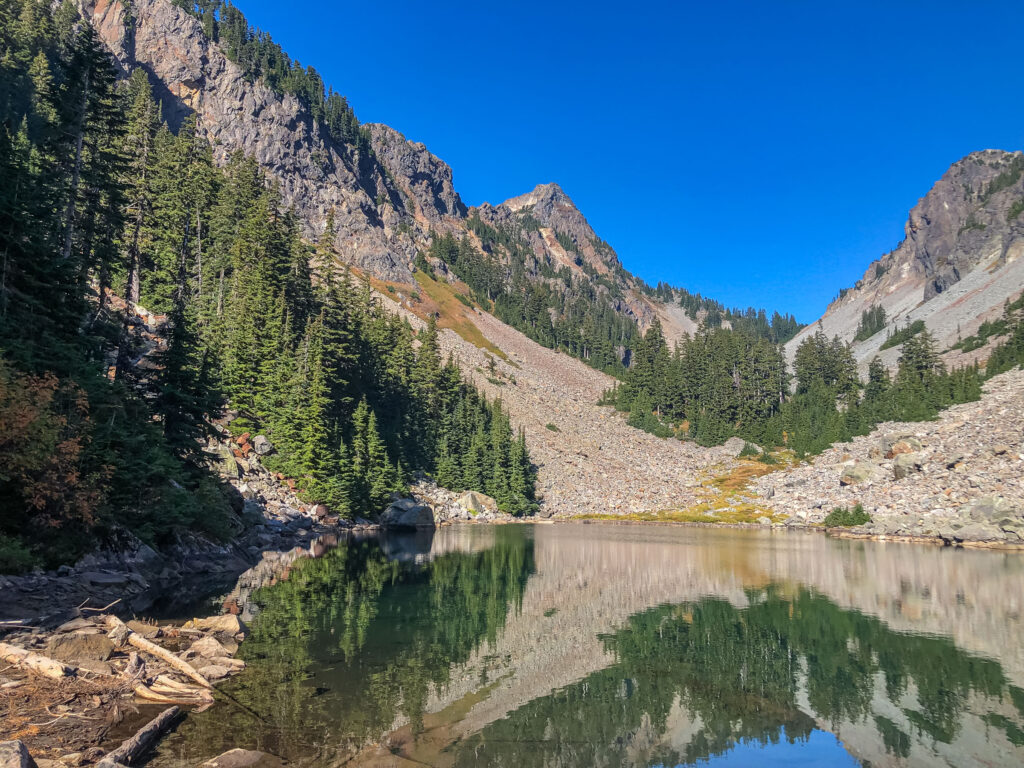
Embrace the Pause
“Silence is the noise thinking makes,” offers Powers. Sometimes when the conversation runs out, I wrack my brain trying to come up with the next topic. During this hike, I let silence come and go, and was pleasantly surprised when my buddy came up with some fascinating things to talk about. And questions of her own. By allowing for pauses and processing time, our conversations go even deeper. And if we happen to expose a raw nerve, then we both realize there’s plenty more to discuss, but we take a gentler approach. Win!
Ask Open-ended Questions
Ask open-ended questions that require more than a “yes,” “no,” “maybe” or “I don’t know” reply. In the world of work, “Do you want a new job?” won’t lead very far. Instead, “What sort of responsibilities are you looking for?” or “How would you like to spend your day at work?” provides room for rich discussion — and may not require a change of job after all.
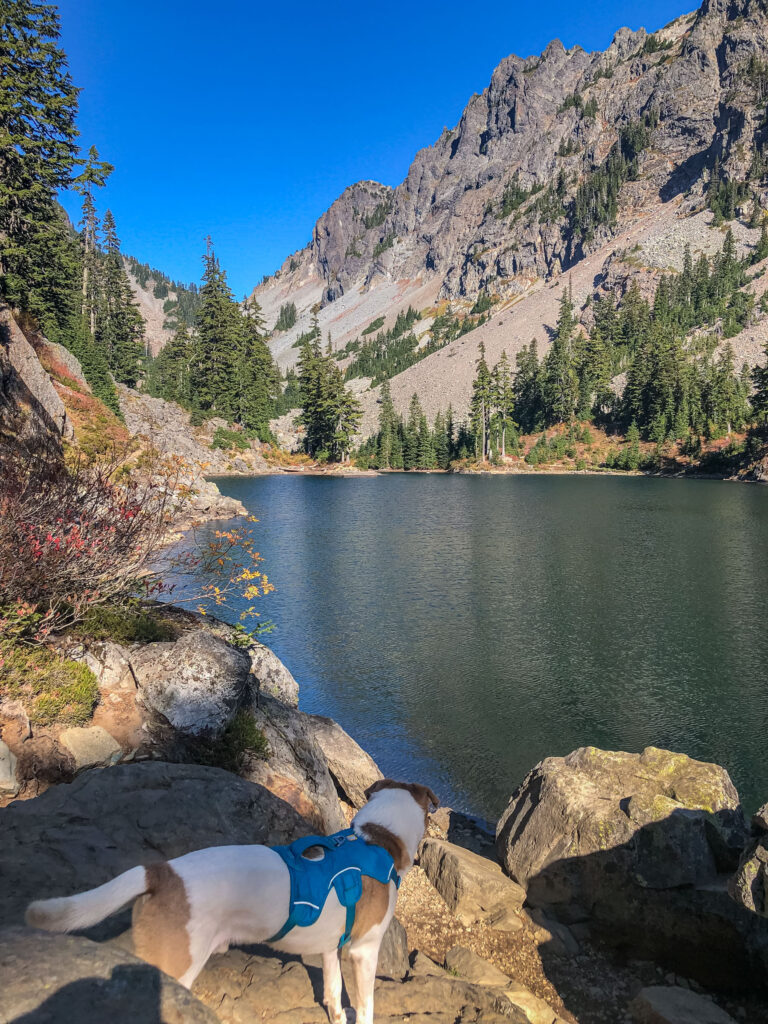
Descending into the Smoke
We had both lakes entirely to ourselves. Unless you count the pair of chipmunks that made Ajax drool for fifteen minutes. As we made our way from Upper to Lower lake, a light breeze stirred, providing us with pleasant relief on an unseasonably warm October day. The levels of both rich emerald-green lakes were lower than usual, and the log jam we crossed to access Lower Lake was bone dry. The Cascade Mountains desperately need rain!
As we descended from Hemlock Pass, we caught our first whiff of smoke. It grew progressively worse, until the haze surrounded us. The breezes must have caused the smoke from fires to the west of us, on the ridge above Snoqualmie, to fill the valley. While we were never in danger, the air quality went from good to unhealthy within hours. Instead of pausing to soak our feet at the Denny Creek Water Slide, we continued directly to the car.
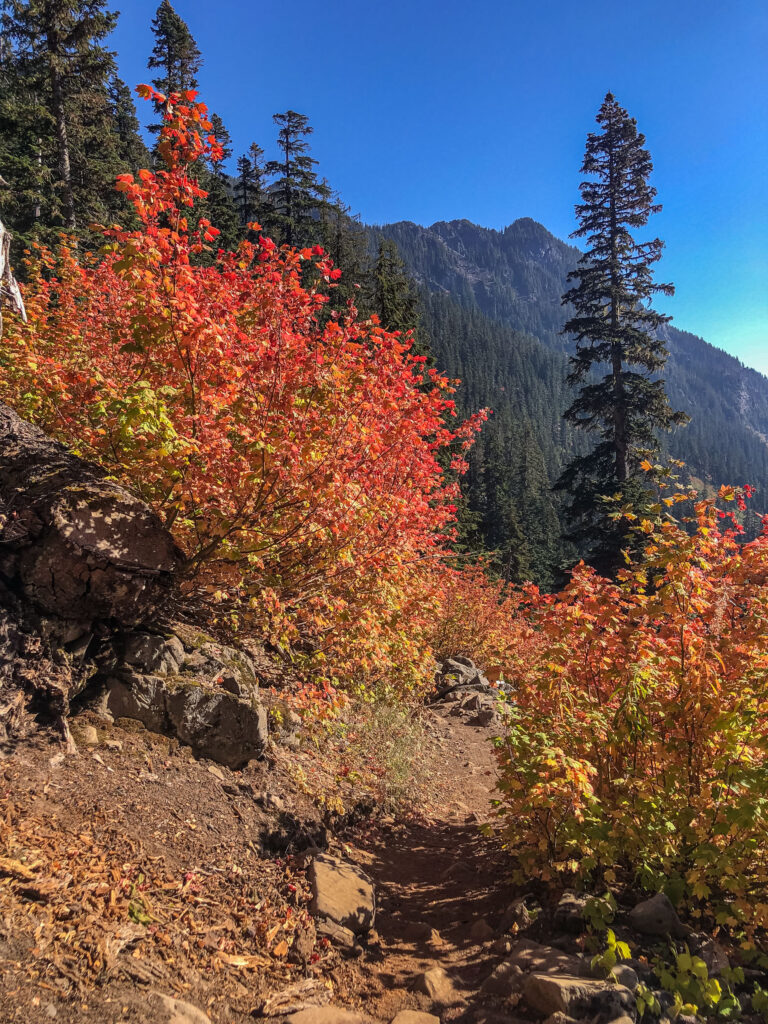
Take-Away: Quality First
My biggest takeaway from this hike, besides gratitude for the hours of clean air, is about appreciating the quality of good questions. It’s important to ask questions the right way because the multiverse will try to answer you. If you ask, “Why can’t I get this?” you’ll find the answer in the form of an excuse. If, instead, you ask, “What can I learn from this experience?” or “What might I try differently next time?” the answer will be much more instructive.
What is your experience with questions? How might you rephrase questions in the future to be more productive, more loving, and more supportive? Share in the Blog comments. We love to hear from readers.


Many thoughts were triggered when I read this great post/discussion; which one to focus on as I prepare to post my comment? I hope this is a good question to ask myself! I think it is, because committing to “paper” all that came to mind would be hard to do… and even harder to digest for a reader. As often, your posts are fully relevant to some particular aspect of my life, past or present. In the case of the “Good Questions” post, it goes directly to a “job” my wife and I took on a couple months ago: trying to help a friend (I’ll call her “Jane” here) deal with the emotional “rapids” she has to negotiate as she goes through a divorce after 25+ years of marriage. My wife invites Jane to the barn where she boards her two Friesian horses; they spend a few hours grooming, feeding, cleaning stalls together…and talking. As Jane likes hiking too, I regularly invite her on my weekday short hikes, combining a good grounding outdoors exercise with an invite for her to share her thoughts and worries. While a lot about helping someone comes down to providing them with a “safe space” to express their thoughts (and we do a lot of that), it also feels important to sometimes “(re)orient” the conversation toward productive/positive/reframing grounds. When I feel like we have come to a good place for me to speak, I try to proceed with questions rather than statements and edicts… but that is where finding “good questions” becomes important and (for me) often difficult. The stakes feel very high every time I try and bring a particular subject, try to help Jane explore another side of her current situation, or revisit some aspect of the past. I don’t just need to find the right words to describe what I invite her to think about… I also need to find the right words for Jane to feel safe and willing to go in that direction. It feels like I am walking on verbal eggshells with every new question I put to her. I will keep in mind as many as your pointers as my aging memory allows; preferring “What/How” over “Why”, letting the pause run its course, asking open ended questions… The more successful I am at following this advice, the better help I will provide I believe. Thanks for sharing yet another readily ACTIONABLE post!
Gerard, what a gift you provide “Jane” – safety, a place to vent and explore options, and outdoor movement which in and of itself can be emotionally healing. Bravo. As for high stakes, I love that you as the question asker feel some vulnerability as well. If you own the “I may be wrong, I often am, but perhaps looking at this from X perspective” with “What / how” and really and truly listening, I believe you cannot go wrong. And if you do (as I did once on the Melakwa Lake hike) a simple, heart-felt apology goes a long way toward patching things up. More tools in the toolkit can only help, so we don’t go through life using a hammer when what we really need most is a feather duster! Bravo.
For my husband & I, asking questions is an integral part of our hiking experience. We just completed five weeks in the White Mountains of New Hampshire, hiking most every day and the questions were wide ranging. I would consider myself a student of asking questions as it seems both an art and a skill. One of my mentors is the poet & philosopher David Whyte, who invites us to ask beautiful questions. For example, in relation to exchanges with others – “What invitation are you making to people that they want to respond to?” Here is a link that provides resources and also many examples of “beautiful questions”. Enjoy!
http://lifecurator.co/life/all-the-beautiful-questions-that-david-whyte-asked-me
Hello Margie,
Welcome back! It sounds like a fabulous trip! Can’t wait to hear more.
I appreciate the link you shared. I was immediately drawn to David Whyte’s statement, “Follow your own questions; don’t mistake other people’s questions for your own.”
This speaks to me on many levels. One example: All we can be is our authentic selves; if we’re not curious in the same ways others are, it doesn’t mean we’re “less than” — and it’s our responsibility to cultivate OUR OWN curiosity and ask about what WE want to know. While my husband does deep dives into bushcraft, survival, and building (as we watch the reality survival series, Alone, on the History Channel), I wnat to find out more about the fascinating animals like the arctic fox, wolverines, moose and marine mammals. And tap into what makes people tick — why compete for $500,000 in the first place and where is each contestant’s breaking point? The show holds immense appeal for us both because we are each asking our own questions.
Super food for thought!
Thanks Courtenay. I love this blog. I agree asking questions is important and an excellent skills to have. Don’t like the why as a first question…what and how are much better. I would try to ask better questions on my next hike on Sunday.
Thanks for your comment, Silvie-Marie! Keep us posted on how “asking better questions” goes for you. We’re all works in progress and can learn from one another. And one of the cool things about bringing awareness to “what, how, why” is when they work and when they don’t. I find having just written about it, I’m more attuned to questions in general and when to bring certain tools out for better use. Can’t use a hammer on something that really needs a pair of pliers! Onward!
Court,
I always feel as if I’ve been on a hike after reading one of your descriptive blogs. My grandson says I ask a lot of questions. I said, “So, ask me a question.”
He did and it made me laugh. He asked me if I was going bald. 🤣 Keep your blogs coming!
Anna
Thanks for the comment and the laugh, Anna! Out of the mouths of babes… Keep on reading!